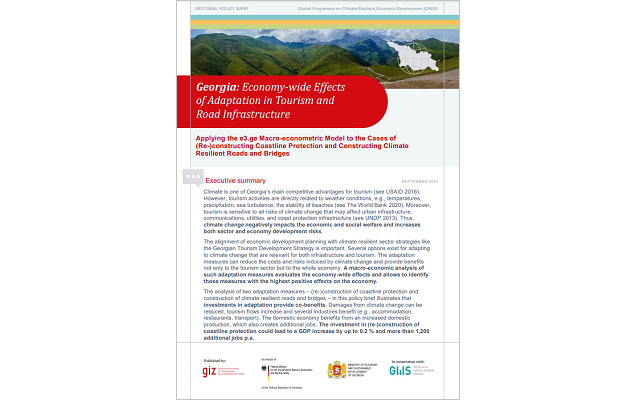Georgia: Economy-wide Effects of Adaptation in Tourism and Road Infrastructure.
Flaute, M., Banning, M. & Lutz, C. (2021): Georgia: Economy-wide Effects of Adaptation in Tourism and Road Infrastructure. Applying the e3.ge Macro-econometric Model to the Cases of (Re-)constructing Coastline Protection and Constructing Climate Resilient Roads and Bridges. Sectoral Policy Brief, Eschborn.Abstract
Climate is one of Georgia’s main competitive advantages for tourism (see USAID 2016). However, tourism activities are directly related to weather conditions, e.g., temperatures, precipitation, sea turbulence, the stability of beaches (see The World Bank 2020). Moreover, tourism is sensitive to all risks of climate change that may affect urban infrastructure, communications, utilities, and coast protection infrastructure (see UNDP 2013). Thus, climate change negatively impacts the economic and social welfare and increases both sector and economy development risks. The alignment of economic development planning with climate resilient sector strategies like the Georgian Tourism Development Strategy is important. Several options exist for adapting to climate change that are relevant for both infrastructure and tourism. The adaptation measures can reduce the costs and risks induced by climate change and provide benefits not only to the tourism sector but to the whole economy. A macro-economic analysis of such adaptation measures evaluates the economy-wide effects and allows to identify those measures with the highest positive effects on the economy. The analysis of two adaptation measures – (re-)construction of coastline protection and construction of climate resilient roads and bridges – in this policy brief illustrates that investments in adaptation provide co-benefits: Damages from climate change can be reduced, tourism flows increase and several industries benefit (e.g., accommodation, restaurants, transport). The domestic economy benefits from an increased domestic production, which also creates additional jobs. The investment in (re-)construction of coastline protection could lead to a GDP increase by up to 0.2 % and more than 1,200 additional jobs p.a.

